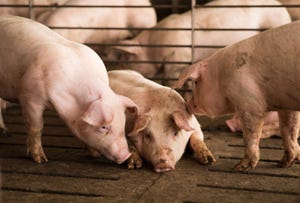Groups kick back at reduced meat recommendations
Legislative Watch: Group suggests reducing meat intake; government shutdown continues; FSA offices have limited openings; ag in or out of EU-U.S. talks?

The EAT-Lancet Commission’s report released this week by the British medical journal, The Lancet, says the world’s population diet and food production must change drastically “to improve health and avoid potentially catastrophic damage to the planet.”
The report is recommending global consumption of red meat and sugar be reduced by 50% while doubling the consumption of nuts, fruits, vegetables and legumes. For U.S. consumers this would mean reducing red meat consumption by nearly 90%. Specifically, the report recommends the daily intake of:
Read meat — zero to 28 grams
Poultry — zero to 58 grams
Fish — zero to 100 grams
Eggs — zero to 25 grams
Dairy foods — zero to 500 grams
The North American Meat Institute says, “However, the EAT-Lancet Commission’s recommendations differ dramatically from consensus nutrition science and U.S. dietary guidance. Americans consume the recommended amount of meat and poultry, which provide nutrition that cannot simply be replaced by another food. In fact, the report’s ‘fad diet’ approach that recommends people radically reduce or even eliminate meat from their diets could have substantial damaging public health consequences.”
The National Pork Producers Council says the report is “based on dubious science and is irresponsible.” Also, “Modern U.S. livestock agriculture is a tremendous example of how the world can produce the nutritious, save food people need while contributing less GHGs (greenhouse gasses) per calorie of food.”
Longest government shutdown continues
We are now in Day 28 of the government shutdown with no solution anytime soon. Realizing the affects the shutdown is having on various government programs, the Trump administration called back approximately 50,000 government employees to work without pay during the shutdown. They include Internal Revenue Service employees as tax season begins, Federal Aviation Administration aviation inspectors, Food and Drug Administration food, drug and medical inspectors, etc.
As the shutdown continues, the administration, Congress and the public will discover more programs that are affected by the shutdown and the impact on the economy.
USDA opens FSA offices for three days
USDA temporarily opened various county FSA offices yesterday, today and next Tuesday for limited services during the government shutdown. The offices will assist with existing farm loans and help provide 1099 tax documents to borrowers to meet the IRS’s deadline.
The offices will not be available to work on new applications for Market Facilitation Program, certification of 2018 production for MFP payments, new direct or facility loans, new farm loan guarantees, new marketing assistance loans, Dairy Margin Protection Program, and disaster assistance programs, including Livestock indemnity Program, Livestock Forage Disaster Program, Emergency Assistance for Livestock, Honeybees and Farm-Raised Fish, Emergency Conservation Program, and Wildfires and Hurricanes Indemnity Program.
Ag in or out of EU-U.S. negotiations
The United States is demanding that agriculture be part of the trade negotiations with the European Union. The EU says agriculture will not be part of the negotiations. Agriculture was one of the key items listed in the administration’s EU-U.S. trade negotiating objectives released by the U.S. Trade Representative last Friday.
Agriculture
Secure comprehensive market access for U.S. agricultural goods in the EU by reducing or eliminating tariffs.
Provide reasonable adjustment periods for U.S. import-sensitive agricultural products, engaging in close consultation with Congress on such products before initiating tariff reduction negotiations.
Eliminate practices that unfairly decrease U.S. market access opportunities or distort agricultural markets to the detriment of the United States, including: Non-tariff barriers that discriminate against U.S. agricultural goods; and restrictive rules in the administration of tariff rate quotas.
Promote greater regulatory compatibility to reduce burdens associated with unnecessary differences in regulations and standards, including through regulatory cooperation where appropriate.
Establish specific commitments for trade in products developed through agricultural biotechnologies, including on transparency, cooperation and managing low level presence issues, and a mechanism for exchange of information and enhanced cooperation on agricultural biotechnologies.
Source: P. Scott Shearer, who is solely responsible for the information provided, and wholly owns the information. Informa Business Media and all its subsidiaries are not responsible for any of the content contained in this information asset.
About the Author(s)
You May Also Like



